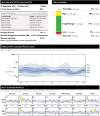Flash glucose monitoring system in special situations
- PMID: 35657123
- PMCID: PMC10118756
- DOI: 10.20945/2359-3997000000479
Flash glucose monitoring system in special situations
Abstract
The management of diabetes mellitus (DM) requires maintaining glycemic control, and patients must keep their blood glucose levels close to the normal range to reduce the risk of microvascular complications and cardiovascular events. While glycated hemoglobin (A1C) is currently the primary measure for glucose management and a key marker for long-term complications, it does not provide information on acute glycemic excursions and overall glycemic variability. These limitations may even be higher in some special situations, thereby compromising A1C accuracy, especially when wider glycemic variability is expected and/or when the glycemic goal is more stringent. To attain adequate glycemic control, continuous glucose monitoring (CGM) is more useful than self-monitoring of blood glucose (SMBG), as it is more convenient and provides a greater amount of data. Flash Glucose Monitoring (isCGM /FGM) is a widely accepted option of CGM for measuring interstitial glucose levels in individuals with DM. However, its application under special conditions, such as pregnancy, patients on hemodialysis, patients with cirrhosis, during hospitalization in the intensive care unit and during physical exercise has not yet been fully validated. This review addresses some of these specific situations in which hypoglycemia should be avoided, or in pregnancy, where strict glycemic control is essential, and the application of isCGM/FGM could alleviate the shortcomings associated with poor glucose control or high glycemic variability, thereby contributing to high-quality care.
Keywords: Diabetes mellitus; blood glucose self-monitoring; liver cirrhosis; pregnancy; renal dialysis.
Conflict of interest statement
Disclosure: no potential conflict of interest relevant to this article was reported.
Figures

References
-
- Hirsch IB. Glycemic Variability and Diabetes Complications: Does It Matter? Of Course It Does! Diabetes Care. 2015;38(8):1610–1614. - PubMed
-
- Garber AJ, Handelsman Y, Grunberger G, Einhorn D, Abrahamson MJ, Barzilay JI, et al. Consensus Statement by the American Association of Clinical Endocrinologists and American College of Endocrinology on the Comprehensive Type 2 Diabetes Management Algorithm – 2020 Executive Summary. Endocr Pract. 2020;26(1):107–139. - PubMed
-
- Beyond A1C Writing Group Need for Regulatory Change to Incorporate Beyond A1C Glycemic Metrics. Diabetes Care. 2018;41(6):e92–e94. - PubMed
-
- Bry L, Chen PC, Sacks DB. Effects of Hemoglobin Variants and Chemically Modified Derivatives on Assays for Glycohemoglobin. Clin Chem. 2001;47(2):153–163. - PubMed
Publication types
MeSH terms
Substances
LinkOut - more resources
Full Text Sources
Medical
